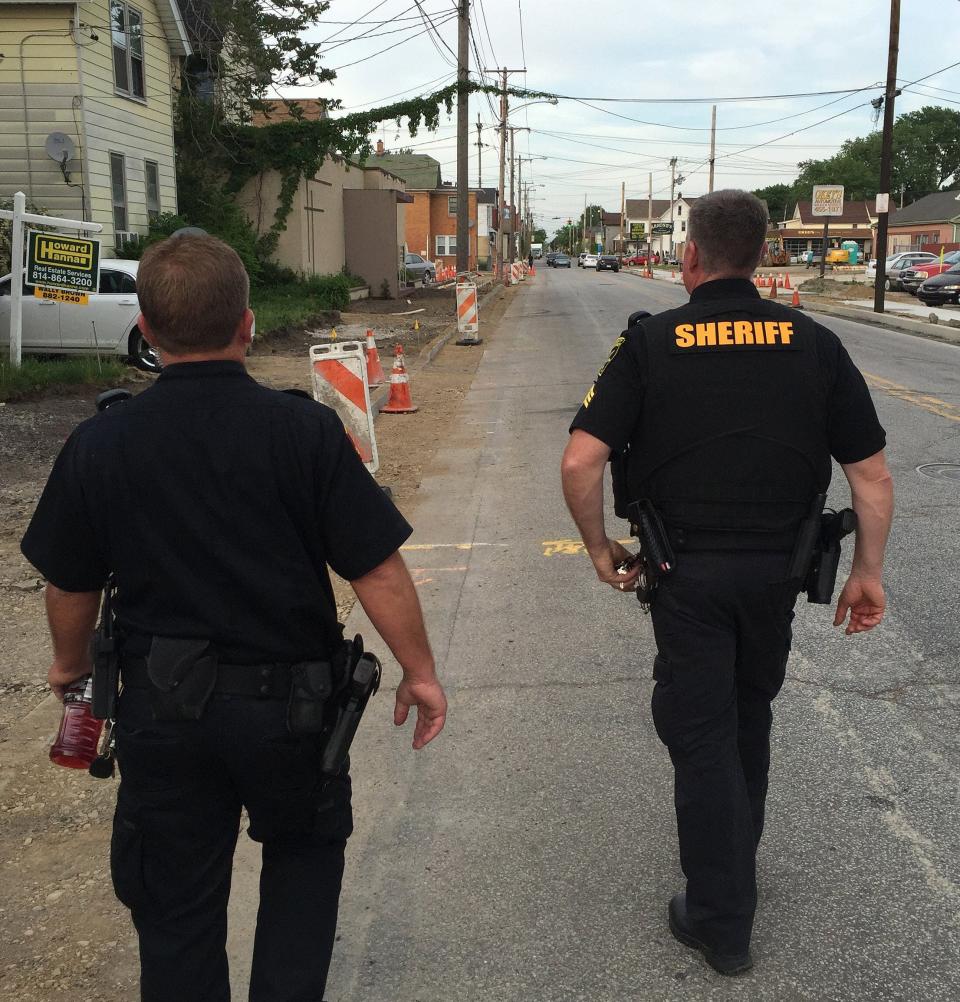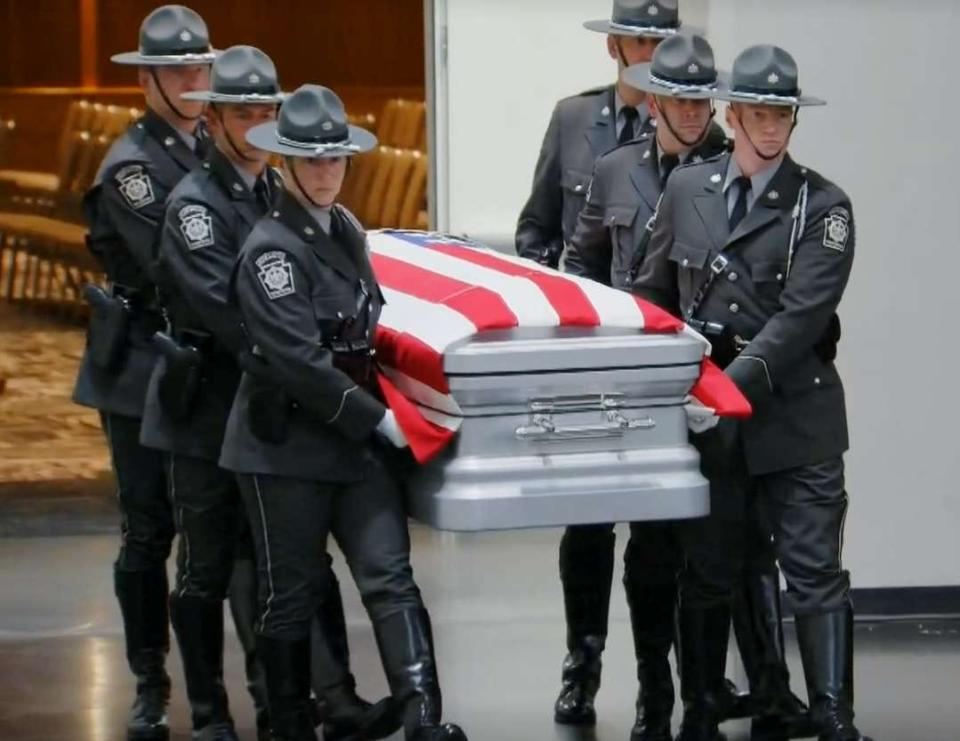Erie-area police agencies reflect on officers' mental health — and where they can get help
On any given day, a police officer might find themselves responding to the worst day of someone's life.
A traffic accident. A mass shooting. A domestic incident.
Depending on the call, the officer might be in danger, or find it necessary to use force, or be required to assume a different role, like a social worker, a guidance counselor or an impartial arbiter.
Regardless, when the officer responds, the physical and mental well-being of the victim is paramount. The same cannot always be said about the responding officer, whose own work-related trauma, stress and anxiety can often go unmentioned and ignored.
"Many years ago, before mental health came to the forefront of the conversation, it was just something officers dealt with in their own way," Millcreek Police Department Chief Carter Mook said.
Erie Bureau of Police Chief Dan Spizarny said the police field used to be known for its heavy drinkers, a reputation he suggested came from officers coping with trauma without the proper resources to handle it.
"Things have changed," he said, "and now trauma-informed care is recognized throughout the public safety field."

Compared to the general population, those in law enforcement have much higher rates of depression, post-traumatic stress disorder, burnout and other anxiety-related mental health conditions, according to the National Alliance on Mental Illness.
In addition to grueling, rotating shifts, sleep disruptions and staff shortages, officers bear witness to traumatic or violent events on a regular basis, all of which can have a significant impact on mental health.
Violence recently shook the police community with the death of Pennsylvania State Trooper Jacques "Jay" F. Rougeau Jr., a Corry native who was killed June 17 when a gunshot pierced through the windshield of his patrol car in Juniata County in central Pennsylvania.

His funeral, which brought scores of troopers from across the state to the Bayfront Convention Center on June 27, was not just a display of trooper solidarity but a solemn reminder of the life-threatening risks inherent in police work.
"(Rougeau) could have been any one of us," said Pennsylvania State Police Corporal Nicholas Stolar of Erie, noting how Rougeau was killed driving on a rural road in Walker Township. "There's nothing saying that someone can't ambush us on any single call we go to."
Pennsylvania State Police Captain Kirk Reese, commander of Troop E, which covers northwestern Pennsylvania, said that kind of pervasive threat of violence, coupled with police encounters with traumatic events, can "wear on you" over time.
He added, however, that troopers must try their best not to get overwhelmed by what they see on duty, insisting, "You can't get stuck thinking about it because you can't do your job."
Erie County Sheriff Chris Campanelli followed suit, saying it takes a "different kind of person" to be in law enforcement.
"You have to have that ability to separate yourself from it," he said, referring to the trauma and violence witnessed on duty. "It's hard, I get it. But I think that's exactly why not everyone can do this job. You need to be mentally and physically fit."
While all the police leaders stressed the importance of training in preventing and addressing trauma and other mental health issues, they said their agencies do have options for employees seeking help.
Peer counselors, employee programs available to officers seeking help
The Pennsylvania State Police offers the Members Assistance Program, or MAP, composed of a 24/7 network of troopers trained to provide confidential peer-based assistance.
The program provides resource referrals, which could be a health professional, lawyer or financial counselor, and also offers training for family members to help them recognize symptoms of post-traumatic stress disorder and other mental health conditions.
"MAP consists of seven full-time regional peer coordinators and approximately 91 peer contacts who serve in that capacity part-time," said Pennsylvania State Police Lieutenant Adam Reed, director of communications at the State Police Harrisburg office.
"There are also 63 volunteer civilian chaplains who are part of the program. The peer coordinators and peer contacts receive continuing training relating to stress management, mental health and crisis intervention."
Reed said MAP was formed in 1986 as one of the first programs of its kind to use "organized, confidential, peer assistance by, and for, its own personnel in law enforcement."
"The law enforcement community across the U.S. faces more challenges than ever before as we strive to do our best to protect the public," he said. "Programs like MAP are a great resource to assist personnel in their time of need."
In similar fashion, the Millcreek Police Department also has peer support officers trained to offer counseling services to those experiencing problems, personally and professionally.
"I've seen homicides, suicides, traffic fatalities. None of it is easy, and we do talk amongst ourselves to try to relieve stress as best we can," Mook said. "For the bulk of my career, we didn't have peer support group services available. Now we do. And I'm seeing that our officers are taking advantage of it."
Campanelli and Spizarny said members of their departments can take advantage of the employee assistance programs made available to all county and city government employees, respectively. The programs provide personal and work-related counseling.
Both men stated they hope to start an internal counseling group, with Campanelli focused on a peer group of deputies and Spizarny thinking of an in-house "crisis intervention team," done in partnership with the Crisis Center at UPMC Western Behavioral Health at Safe Harbor.
Both men said the ideas are still in the works.
"I think that we're sharing a lot more about trauma-informed care and that's not only for the victim or the witnesses of crimes but also with the first responders and how they deal with trauma," Spizarny said. "So, we're getting better in looking out for our first responders."
A.J. Rao can be reached at arao@gannett.com. Follow him on Twitter @ETNRao.
This article originally appeared on Erie Times-News: Erie-area police reflect on mental health options for officers

